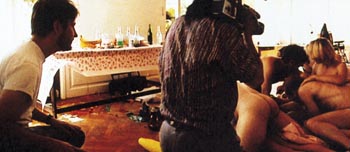RULES OF THE GAME
Unveiled two years ago at Cannes, the Dogme 95 manifesto, penned by Danish directors Lars von Trier and Thomas Vinterberg, has proved an inspiration to low-budget American independent filmmakers. But amidst all the joy of being liberated from camera dollies, production design, and lengthy lighting setups, there’s a tendency to forget that the Dogme rules can also be somewhat, well, dogmatic. D.W. Leitner interviews Jesper Jargil, director of The Humiliated, the new DV feature documenting the filming of von Trier’s own Dogme film, The Idiots, and discusses the creative contradictions of the now-famous manifesto.
 |
| Lars Von Trier (left) directs the group in The Idiots |
During my conversation with veteran Danish director Jesper Jargil following the docfest ’99 screening of his new doc, The Humiliated, Jargil told me that Jean-Luc Godard had recently sent Lars von Trier a letter. In it, the great French director said that while he didn’t like von Trier’s previous films, with his latest, The Idiots, he was really starting to do something.
Leave it to Godard, whose pioneering use of small crews and available light engendered the ultra-compact 35mm Aaton, to endorse a raw and demanding spirit not unlike his own, even though von Trier’s and Thomas Vinterberg’s Dogme 95 manifesto repudiates the core New Wave conceit of the auteur. Despite Godard’s admiration, however, The Idiots has proven a tough follow-up to the widely acclaimed Breaking the Waves. Premiering at Cannes in 1998 to mixed reviews, the film still awaits a U.S. release from the newly christened USA Films.
However, that doesn’t make The Humiliated, Jargil’s sly take on the vicissitudes of filming The Idiots, any less fascinating. True to the anti-artifice tenets of Dogme 95, von Trier decided to shoot The Idiots mostly himself with a handheld Sony VX-1000 digital camcorder. Jargil, with his own VX-1000, tracked von Trier’s every step and misstep. He also layered his film with audio excerpts from von Trier’s nightly diary recordings. The result is perhaps the best exposé of a director’s torment and triumph since Truffaut’s Day for Night. What’s more, it’s real.
 |
| Von Trier with Bodil Jorgensen and Louise Hassing |
Filmmaker: I noticed in The Humiliated you sometimes slowed down action for dramatic effect.
Jesper Jargil: Not very often.
Filmmaker: So Dogme 95 permits a little breaking down of the rules, doesn’t it?
Jargil: I didn’t have to adhere to the Dogme rules in my film. I think I adhered to seven of them, but three of them I could not. Just using Lars’ [nightly audio] diary and putting that over everything as voiceover is breaking the rules. And I even put my name on as a director, which is also breaking the rules. That is maybe the stupidest rule of all. You cannot write it on the film, but if you have a bus ad, as in The Celebration by Thomas Vinterberg, what they do is, "Directed by" and then four dots for "Lars" then three dots, then five dots, so you can kind of guess it’s Lars von Trier. That rule I don’t understand; it seems more pretentious than real. It’s a stupid rule.
Filmmaker: Who wrote these rules?
Jargil: Lars von Trier and Thomas Vinterberg wrote them in a half hour while they were laughing some evening four or five years ago.
Filmmaker: So we should take them a little bit with a sense of humor.
Jargil: Oh, definitely. But also with a sense of seriousness. When a Dogme film is finished in Danish, it gets a certificate at the beginning that says it’s a Dogme film. But one day, when The Idiots was finished, suddenly the producer, Vibeke Windelov of Zentropa, came to the sound engineer and said, "I’ve sold the film to Spain, but they don’t want to subtitle it. They want to dub it." This came as a shock for the sound engineer. Dubbing being so much against the rules of Dogme, he never even considered the possibility. But the way the film was shot, we always started with the old-fashioned clap, just to secure that everything was in sync with the DAT recorder, so the sound engineer always had ten seconds of silence after the clap. And then he would record the sound, and everyone would be silent, and you could hear birds singing or whatever the sound atmosphere was. So that was great luck because we have these 10 seconds of scenes that he could repeat or put into the dubbed scenes. And when Lars heard about this — because eventually we had to tell him that we were doing this — he said, "When we do this, these versions cannot have the Dogme certificate!"
But in The Humiliated, I don’t go very much into the Dogme rules. They are there, but it’s not what it’s about. My new film [documenting several Dogme productions underway around the world] is going to be about the blessings and the irritations the Dogme rules give you, and this will be the main story, seeing how the different actors and directors cope with the rules. Sometimes they cheat.
Filmmaker: Rules aren’t fun unless you break them, right?
Jargil: Yes, but you get a bad conscience after you break them, especially when you have someone like me coming in like the "Dogme police" to show that they put blankets in front of windows sometimes. There was a day scene in The Idiots where Stoffer, the main male character, is carried out naked — he’s going crazy, completely bananas. And shooting was going late, and Lars von Trier pleads to do the next scene afterwards even though the day is over. We know it’s late, but we go do it up in an attic where there’s only a small, small, small window. The crew and I go up in this attic before the actors arrive, and there’s a lamp up there. Great, we’ll use it, and it’ll give sufficient lighting.
Then we looked around in the attic and there was nowhere to plug it in, so the sound engineer says, "Down in the car I have an extension cord." So he went and got it. Everything is fine — we have light. And then Lars comes and says, "Where does this cord come from?" And the sound engineer sort of blushes a little, and he says, "Well, my car." And Lars says, "This is not possible, you cannot do this." So because in this house where we were shooting there were no extension cords, we have to take it away. Lars tells the actors they have to find an extension cord. So some of the actors went over to the neighbors and said, "Hello," — just like asking for a cup of sugar — "do you have an extension cord?" They get back, and we put it up, and now it’s a Dogme electric wire, but it wasn’t before. And Lars was really angry and made a speech: "This is a Dogme cord, and this is not a Dogme cord!"
But Dogme is really a thing for the actors, it’s a great thing for the actors, because they are kept in focus all the time, they don’t have to wait. Even though it seems when you read the rules that they don’t have help with makeup, they don’t have help with costumes, things like that, it can seem like they’re sort of lost in it. But the Dogme rules are really to make the best of the abilities of the actors.
Filmmaker: So the actors have to trust the director more than ever because they don’t have the benefit of costume, the benefit of lighting, or the benefit of makeup. They are rather naked, in a way that they aren’t traditionally, in front of the camera.
Jargil: And at the same time, because of the Dogme rules, if I have a close-up of you and I want the answer from the other actor in this closeup, I just take the sound when he answers you. With Dogme, if I know that I want to keep the shot in, the actor must say it at precisely the right time. So in many ways you have to edit a lot of scenes in your head. The good thing about the Dogme rules is that afterwards, the editing process is fairly simple, and there’s no sound editing. Because it’s cheap and DV and everything, you’re not restricted by the cost of 35mm going through the camera.
Filmmaker: The taxi meter isn’t turning.
Jargil: No it’s not. It doesn’t cost anything, but then again it does cost, of course, on the editing table when you have to look through so much material. But the editing is also limited. The Idiots breaks many rules in editing, and you really accept it too, like in The Kingdom. He breaks the rules all the time.
Filmmaker: It’s become more a cinema of glimpses now — you glimpse momentarily this, this, then that, as the camera passes by quickly. And those impressions add up psychologically. That’s my take on it. But I felt in watching The Humiliated that you anticipated many times events that were going to unfold. I know that you know von Trier very well and that you can anticipate his actions, or ways that he’s going to be.
Jargil: I’ve known him so long that I’m not going to be shocked when he says ten times in a day that he’s going to die from cancer next week. It becomes sort of a manner of speech, like if we were talking about whether it’s going to rain tomorrow. Lars is very into hypnosis, and in many of his films he uses hypnosis. Because he’s so interested in hypnosis, I said, "Lars, why don’t you get hypnotized so you get rid of these terrible phobias you are suffering from?" And he said, "No, no, no, I don’t want to lose control, nobody’s going to hypnotize me."
Filmmaker: He has a phobia about losing his phobias?
Jargil: A phobia about losing control. He would never go into an airplane, or he would die. And elevators. If he had a meeting on the 84th floor in one of these buildings, he would walk all the way up. And like this musical he’s shooting with Bjork, Dancer in the Dark, the setting is the state of Washington in the ’50s. Normally, you would shoot it in Washington, but because he is so afraid of going by airplane, he is shooting it in the woods in Sweden, and everything is made as if it’s Washington.
Filmmaker: Can the musical form co-exist with the Dogme rules?
Jargil: No. Well, it can, but it’s difficult. Actually, I have an old idea that I told Lars. I always wanted to do Mozart’s Don Giovanni, which is my favorite opera, Dogme style. But doing it Dogme style, we would have to take the orchestra along with us all the time!
Filmmaker: When you make this Dogme opera, who will make the documentary about you making this?
Jargil: I don’t know. Actually, I think any movie being made now has to have a film made about it. A good friend of mine, a Danish guy [Anders Refn] who made the film Pusher, just did another film, and he had two people running around him all the time shooting a film about the film. I think we’re going to see more films about films. They’re easy to do. You just need one person to run around with a DV camera and something interesting is bound to happen.
VOD CALENDAR


 See the VOD Calendar →
See the VOD Calendar →


